Announcements
NERDS IN HARMONY
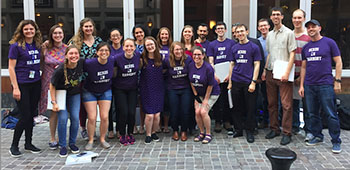
Love to sing? Want to meet other science and music enthusiasts? Join the Nerds In Harmony! This co-ed acapella group welcomes anyone who works at NIH, from postbacs to PIs. No auditions necessary. Nerds in Harmony is especially looking for basses, tenors, and beatboxers. The group rehearses Mondays and Wednesdays from 5:30 to 7:00pm in the NIH Clinical Center and performs around the NIH and in the Bethesda-Chevy Chase area. For more information, email nerdsacappella@gmail.com or check Nerds in Harmony out on Facebook, Instagram, or YouTube!
CAREGIVING? NIH CAN HELP
- Resource and Referral Services: 1-800-777-1720
- Child and Family Programs website: www.childfamilycare.ors.nih.gov
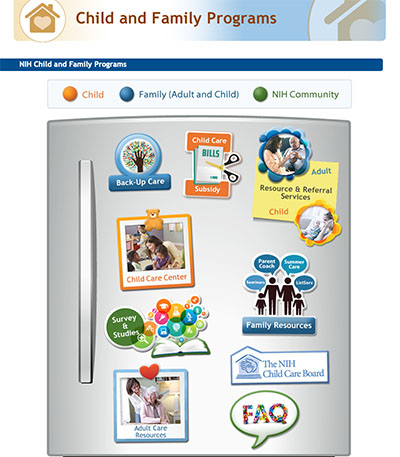
NIH is leading the way in providing community support programs and services to employees, trainees, and contractors across the United States to ease the burden on caregiving stressors. The Resource and Referral Services in the Office of Research Services (ORS) is an invaluable resource that provides a variety of resources to address needs related to childcare, adult dependents, legal and financial issues, and identity theft. To use the service, one calls 1-800-777-1720 and identifies his or her needs with an intake specialist. A resource specialist calls back within 24 hours during the workweek, conducts a confidential discussion and provides referrals and resources via email within two business days. The beauty of this service is the identification of comprehensive resources available in communities nationwide without having to navigate this time-consuming process on your own.
Data from the 2012 Life@NIH Survey and the 2017 OPM Work-life Federal Survey project the needs for NIH adult care resources are tripling every five years. In the 2012 Life@NIH Survey, supervisors were asked if they received any guidance or training in talking with their employees about work-life programs and services. The majority of supervisors (73 percent) reported they had not received any guidance.
Recognizing the need to provide support to NIH employees and those caring for adult dependents, the Aging and Adult-Dependent Care Committee (AADCC) was chartered in January 2016 to help facilitate the development of aging and adult dependent-care resources. The AADCC membership will be open to new volunteers starting in December 2019.
To enhance supervisor’s awareness of the multiple resources offered to the NIH workforce, the NIH Work-life@NIH: A Supervisor’s Guide to Enhancing Workforce Well-being training was developed by the ORS and the Office of Human Resources. The Work-life training is a result of the 2012 Life@NIH Survey and is offered to supervisors at NIH on a quarterly basis and for two Continuous Learning Points (supervisory refresher purposes).
In December 2018, the NIH Office of Research Services (ORS), the Aging and Adult-Dependent Care Committee (AADCC) collaborated with the NIH Clinical Center Nursing Department to issue a survey aimed to assess employees’ awareness of various work- life services. The survey aimed to capture employees’ need for services such as aging and adult dependent care.
The recent NIH Nurses Survey and previous surveys, specifically the 2012 Life@NIH and the 2017 OPM Work-life Federal Survey, demonstrate that employees at the NIH—and across the federal government—are increasingly in need of resources to help them navigate aging and adult-dependent related needs. The NIH Nurses Survey showed
- 23% of respondents already have aging or dependent adult care needs with an additional 39% anticipating having adult dependent/elder care needs while working at the NIH;
- 16% have adult dependents who live with them;
- 19% have adult dependents who do not live with them; and
- 5% have an adult child with special needs.
To learn more about aging and adult-dependent care programs, visit the NIH Child and Family Programs website: www.childfamilycare.ors.nih.gov.
FAES ACADEMIC PROGRAMS FALL 2019
- Online Registration: July 15–September 6, 2019
- Late registration until September 9 (late fee applies)
- Open House: August 22, FAES Academic Center (Building 10)
- Website: https://faes.org
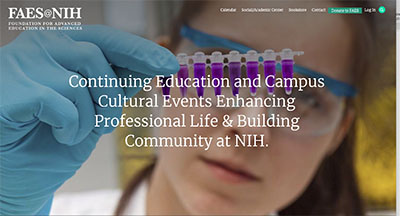
The FAES Academic Programs has seven departments and offers more than 200 graduate evening courses and daytime workshops to fit around the schedule of working professionals at the NIH. Most courses and workshops are conveniently located on the main NIH Bethesda campus. FAES also offers a growing number of graduate courses online. Graduate courses are credit-bearing and cover fields relevant to the biomedical research community: biochemistry, bioinformatics, biology, chemistry, epidemiology, genetics, immunology, mathematics, medicine, microbiology, pharmacology, public health, statistics, technology transfer, toxicology, MCAT Review, GRE, English as a Second Language, Spanish, and more.
Students can also further their education and career development by completing FAES’s Advanced Studies in Bioinformatics and Data Science or Public Health or Technology Transfer. Courses are open to the NIH community, other federal employees, and the general public. Tuition for graduate courses is $160-$177 per credit. To enroll online and to view class times, location, and tuition information, visit www.faes.org, email registrar@faes.org, or call 301-496-7976. The FAES Academic Programs Office is located in Building 10, Room 1N241 (close to Masur Auditorium).
NCI MYELODYSPLASTIC SYNDROMES SYMPOSIUM
- Friday, July 12, 2019, 11:00 a.m.–5:00 p.m.
- Porter Neuroscience Building (35A) Room 620/630
- To register, go to https://ncifrederick.cancer.gov/events/conferences/NCIMDS2019/registration
The purpose of the symposium is to bring together and inform the academic and community hospital clinicians about the latest clinical and translational research in myelodysplastic syndromes and secondary AML currently taking place at the NCI CCR and the NIH intramural research programs. The agenda will cover following objectives:
The symposium will include speakers from the NIH intramural research programs and a special keynote guest speaker
Overall Goal: Review most recent advancement of biology and therapeutics for MDS and secondary AML. Provide information on MDS clinical trials currently available or planned at the NCI Phase 1 Developmental Therapeutics Clinic and the CCR. Build a strong patient referral base collaboration between the extramural community oncologists and academia oncologists/hematologists to develop future cures and novel treatments for these diseases. In collaboration with the NIH Myeloid Malignancy Special Interest Group
WEDNESDAY AFTERNOON LECTURES SERIES (WALS) RESUMES IN SEPTEMBER
- September 18 — lecture to be announced
- Masur Auditorium, Building 10, 3:00–4:00 p.m.
- Website: https://oir.nih.gov/wals
The NIH Director’s Wednesday Afternoon Lecture Series, colloquially known as WALS, is the highest-profile lecture program at the NIH. Lectures occur on most Wednesdays from September through June from 3:00 to 4:00 p.m. in Masur Auditorium (Building 10) on the NIH Bethesda campus. The 2019–2020 season begins on September 18 with a speaker who is sensational. Trust us. We expect to post the 2019–2020 schedule in August at https://oir.nih.gov/wals.
NIH TALKS DURING JULY AND AUGUST AT NIH
- Link to NIH calendar: https://calendar.nih.gov/app/MCalWelcome.aspx?SrchType=Month
For a complete list of NIH talks during July and August, click on the above link. Some of the events are listed below.
MICRO-RANDOMIZED TRIALS TO OPTIMIZE THE DESIGN OF MOBILE HEALTH INTERVENTIONS
- Tuesday, July 9, 2:00–3:00 p.m. (Eastern Time)
- Registration required: https://prevention.nih.gov/education-training/methods-mind-gap/using-micro-randomized-trials-optimize-design-mobile-health-interventions.
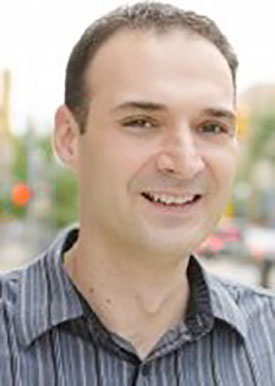
The next Mind the Gap webinar is “Using Micro-Randomized Trials To Optimize the Design of Mobile Health Interventions,” by Predrag Klasnja, University of Michigan. Mobile Health (mHealth) interventions often include theory-based components, such as goal-setting, self-monitoring, planning, etc. To implement these components in a concrete technology, such as an app, researchers and designers must make many decisions about how exactly the intervention components should work (for example, the timing of delivery of each component, the specifics of user interaction)—decisions that go beyond the guidance provided by the theories on which the components are based. In this presentation, Klasnja will describe how micro-randomized trials can be used to make data-driven decisions about how exactly individual components of mHealth interventions should work to optimize their effectiveness. He will argue that a key value of micro-randomized trials during intervention development is their ability to generate data for informing decisions about the many specifics—from the design of the interface to the adaptation algorithms—that must be determined to implement an mHealth intervention. Data from micro-randomized trials enable such decisions to be made in ways that maximize intervention effectiveness while minimizing user burden. This event is open to the public and there will be an opportunity to ask questions at the end of the presentation. Feel free to share this information widely. For more information, contact MindtheGap@od.nih.gov.
BEST PRACTICES FOR THE APPROVAL AND CONDUCT OF SECONDARY RESEARCH
- Tuesday, July 9, 2:00–3:00 p.m.
- Lipsett Auditorium (Building 10)
- Videocast: https://videocast.nih.gov
The NIH Intramural Research Program’s Office of Human Subjects Research Protections (OHSRP) Education Series presents, “Best Practices for the Approval and Conduct of Secondary Research, including Repositories.” The OHSRP Director, Jonathan Green, and OHSRP analyst, Julie Eiserman, will be conducting this presentation. As we move toward centralization of institutional review boards (IRBs) and uniform review and approval processes, it’s important that investigators have a clear understanding about the ideal means to obtain new and continuing IRB approval for primary and secondary research. In this vein, the presentation will cover various concepts related to human subjects research; when research requires IRB review and approval; when protocols should remain open and when they can be closed with the IRB; examples of current NIH approaches as well as best practices for IRB approval and the conduct of primary and secondary research including the creation of repository protocols. At the end of this session, participants should be able to: This session is open to the NIH community and advanced registration is not required. This session will be videocast.
IS RELAPSE AND RECYCLING NECESSARY FOR RECOVERY FROM ALCOHOL USE DISORDER?
- Thursday, July 11, 1:30–3:30 p.m.
- Masur Auditorium (Building 10)
- Videocast: https://videocast.nih.gov

The NIAAA presents the 11th Annual Jack Mendelson, M.D., Honorary Lecture, “Is Relapse and Recycling Necessary for Recovery from Alcohol Use Disorder?” by Carlo C. DiClemente, Professor Emeritus, Department of Psychology, University of Maryland, Baltimore County (UMBC). DiClemente’s research assesses the process of smoking initiation and cessation, SBIRT training in medical residency programs, motivation and stages of change for a variety of health behaviors, and understanding mechanism of change in alcohol and substance abuse. A co-developer with James Prochaska of the transtheoretical model (TTM) of behavior change, DiClemente has published numerous articles, chapters, and books. For more than 30 years, he has conducted funded research in health and addictive behaviors. He has directed an outpatient alcoholism treatment program and serves as a consultant to private and public treatment programs.
12th Annual Graduate and Professional School Fair
- Wednesday, July 17, 8:45 a.m. to 2:45 p.m.
- Exhibits will be open from 9:45 a.m. to 1:45 p.m.
- Natcher Conference Center (Building 45)
The 2019 NIH Graduate and Professional School Fair provides an opportunity for NIH summer interns (especially those in college) and postbacs, as well as other college students in the DC area, to prepare for the next step in their careers by exploring educational programs leading to the Ph.D., M.D, D.D.S., M.D.-Ph.D., and other graduate and professional degrees. More than 200 outstanding colleges and universities from across the U.S. will send representatives of their graduate schools, medical and dental schools, schools of public health, and other biomedically relevant programs in the hopes of recruiting NIH trainees. The day will also include workshops on getting to graduate and professional school; M.D.-Ph.D. programs; interviewing; and careers in public health, computational biology/bioinformatics, psychology, and dentistry. A list of institutions planning to attend and registration information can be found at https://www.training.nih.gov/gp_fair.
NIH.AI WORKSHOP ON HYPERPARAMETER OPTIMIZATION
- Thursday, July 18, 2:00–5:00 p.m.
- FAES Classrooms 6 & 7 (Building 10)
- Registration required: https://lms.learning.hhs.gov/Saba/Web/Main/goto/GuestOfferingDetails?offeringId=class000000000145694
Do you need to apply Hyperparameter Optimization in your research? Do you even know what that means? If you just answered yes to the first question or no to the latter, then please join us for a three-hour NIH.AI Workshop on Hyperparameter Optimization (HPO). This workshop will bring together members of the Intramural Research Program who use or wish to use computational tools for HPO, in order to share methods and resources for getting started. The workshop will include targeted presentations and will offer plenty of time for open discussion among peers with hands-on demonstrations across disciplines.
AAAS MARTIN AND ROSE WACHTEL CANCER RESEARCH AWARD AND LECTURE
- Friday, July 19, 12:00–1:00 p.m.
- Lipsett Amphitheater (Building 10)
- Register to attend by July 5 at https://aaas-org.ticketbud.com/wachtel-award-rsvp (free admission, followed by lunch)

The lecture, titled “Structure and Function of Mammalian SWI/SNF Complexes in Human Disease” will be given by Cigall Kadoch, Ph.D., Assistant Professor of Pediatric Oncology Dana-Farber Cancer Institute and Harvard Medical School. The Wachtel Cancer Research Award is presented to young cancer researchers who have made outstanding contributions to the cancer field. This is the seventh lecture for the AAAS Martin and Rose Wachtel Cancer Research Award sponsored by the American Association for the Advancement of Science (AAAS) and Science Translational Medicine. NCI is co-hosting the event. Kadoch’s laboratory is centered in understanding the structure and function of large, macromolecular machines called ATP-dependent chromatin remodeling complexes, with an emphasis in dissecting their roles in human disease and identifying new therapeutic opportunities. The efforts in the lab are highly multidisciplinary, integrating biochemistry, biophysics, structural biology, genomics and epigenomics, as well as systems biology. Through comprehensive studies to define the functions of mammalian SWI/SNF chromatin remodeling complexes in governing gene expression coupled with disease-specific investigations to identify the mechanisms underlying their frequent perturbation, the lab aims to develop new methodologies for the study of chromatin regulation and to identify novel therapeutic strategies to target a broad range of human maladies. Kadoch’s award essay will be published in Science Translational Medicine the week of the award ceremony.
SUMMER POSTER DAY 2019
- Thursday, August 8, 9:00 a.m.–3:00 p.m.
- Natcher Conference Center (Building 45)
Summer Poster Day provides an opportunity for summer interns to share the research they have been conducting at the NIH and at the same time develop their communication and networking skills. This year more than 1,000 summer interns are registered to present posters. Investigators, staff scientists, and scientific administrators can make a particularly important contribution to Summer Poster Day by visiting posters and engaging their authors in discussion. For more information, visit https://www.training.nih.gov/summer_poster_day.
SYMPOSIUM ON EXPERIMENTAL IMAGING OF INFECTIOUS DISEASES
- Monday, August 12, 8:00 a.m. to 5:00 p.m.
- Lipsett Amphitheater (Building 10)
- For information on poster submission and to register: https://www.eventbrite.com/e/symposium-on-experimental-imaging-of-infectious-diseases-tickets-63009875233
The event is sponsored by the NIAID Integrated Research Facility and the CC Center for Infectious Disease Imaging, which perform advanced imaging research on high-consequence, emerging infectious diseases, including positron emission tomography, magnetic resonance imaging, nuclear medicine studies, computed tomography, ultrasound, and optical imaging in the BSL-4 high containment facility.
NHLBI MITOCHONDRIAL BIOLOGY SYMPOSIUM
- September 26–27
- Natcher Conference Center (Building 45)
- To register (deadline September 16): https://www.eventbrite.com/e/the-2019-nhlbi-mitochondrial-biology-symposium-registration-54765893261
- For more information, visit https://2019mbs.com/
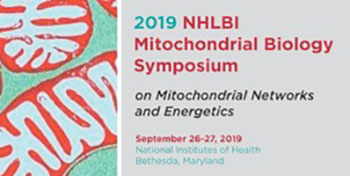
The 5th NHLBI Mitochondrial Biology Symposium on Mitochondrial Networks and Energetics will bring together experts from around the world to review advances in our understanding of how mitochondrial structure, function, and interactions within the cell contribute to diseases and aging; and highlight recent progress made with animal models and therapeutic interventions. While mitochondria have long been known for their energy-providing roles, researchers are uncovering more and more cellular processes in which these organelles are crucial. We have come to recognize just how deeply mitochondria can impact human health, but our understanding still has a long way to go. It is essential that we continue to advance our knowledge of mitochondria as part of the integrated cell as well as in animal and disease models. A better conception of the underlying regulatory mechanisms is critical to developing truly effective therapies.
Mitochondrial Networks: Mitochondria play a major role in many cellular processes working in coordination with other organelles within the three-dimensional cell. Thus, in addition to maintaining mitochondrial quality, mitochondrial content, size, shape, and location relative to other cell constituents are each critical to mitochondrial support of cellular function. The latest findings on mechanisms regulating mitochondrial dynamics, turnover, and interactions from diverse experimental and disease models will be discussed.
Mitochondrial Energetics: The classical role of mitochondria in energy metabolism remains a hot topic as metabolic defects are described in an ever-increasing number of diseases and cell types. The latest findings on activating, enhancing, and assessing mitochondrial function across the spectrum of tissues and diseases will be discussed.
This page was last updated on Monday, April 4, 2022
